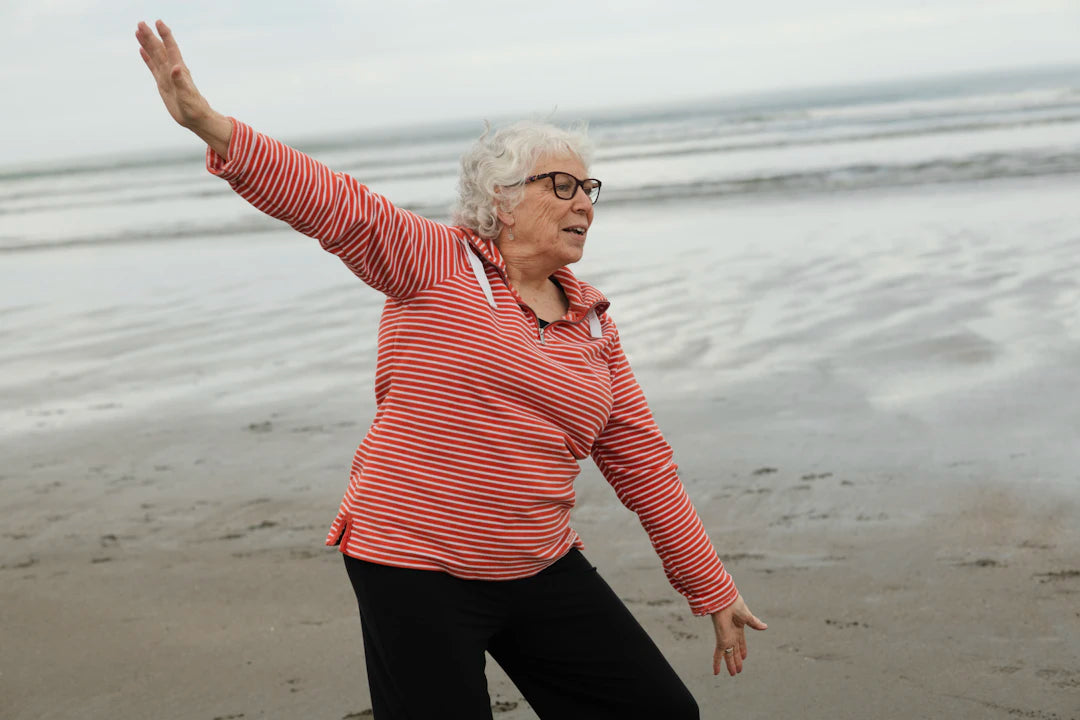
Gentle Cardio: Easy Mobility Routines for Seniors
Share
Overview
Low-impact cardio exercises are essential for seniors to maintain heart health and mobility without straining joints. This blog discusses the benefits, common challenges like joint pain and motivation struggles, and offers top exercise options such as walking, swimming, and Tai Chi. Tips for creating a personalized routine and staying motivated are also provided, along with healthy lifestyle habits to enhance overall well-being. Embrace movement for a healthier, happier life!
Frequently Asked Questions
1. What are low-impact cardio exercises?
2. What are the benefits of low-impact cardio for seniors?
3. What challenges do seniors face in staying active?
4. What are some examples of low-impact cardio exercises for seniors?
5. How can seniors stay motivated to exercise regularly?
As we age, staying active becomes crucial for maintaining our overall health and well-being. However, many seniors face challenges such as joint pain, balance issues, and motivation struggles that can make traditional exercises daunting. That's why low-impact cardio exercises can be a game changer! They help keep our heart strong while being gentle on our bodies. In this blog, we will explore top low-impact cardio exercises tailored for seniors, offering easy mobility routines to boost your health and happiness.
Understanding Low-Impact Cardio
Low-impact cardio exercises are activities that elevate your heart rate without being hard on your joints. They provide great benefits without considerably straining your body, making them perfect for seniors. When starting a routine, it's essential to have a clear understanding of its benefits and how to incorporate them safely into your daily life.
Benefits of Low-Impact Cardio for Seniors
- Improved Heart Health: Low-impact exercises can strengthen your heart and improve circulation, lowering risks of heart disease.
- Enhanced Mobility: Regular movement helps maintain flexibility and balance, reducing the chance of falls.
- Weight Management: Burning calories helps manage weight, thus reducing strain on joints.
- Boosted Mood: Exercise releases endorphins, which can enhance your mood and overall mental health.
- Social Interaction: Finding a class or exercising in a group provides a sense of community, helping motivate you to stick with it.
Common Challenges and How to Overcome Them
It’s common for seniors to face barriers to regular exercise, such as:
Joint Pain
If you experience discomfort in your joints, opt for activities that alleviate strain. Swimming or cycling can be fantastic alternatives since they offer resistance without the impact of running or jumping.
Balance Issues
Safety is a priority. Consider using a wall or chair for support while doing standing exercises, or focus on seated workouts that minimize fall risks.
Motivation Struggles
Finding the motivation to begin a workout routine can be challenging. Setting small, achievable goals and tracking your progress can help. Working with a friend or joining a fitness group can also provide the encouragement you need to keep moving.
Top Low-Impact Cardio Exercises for Seniors
Now that we’ve discussed the challenges, let’s dive into specific low-impact cardio exercises. Incorporate these easy mobility routines into your weekly schedule, and remember to listen to your body at all times.
1. Walking
Walking is one of the simplest yet most effective forms of low-impact cardio. You can start by walking for 10-15 minutes a day and gradually increase this time as you build endurance. Whether indoors at a mall or outside in the park, walking can fit into any lifestyle.
- Tip: Consider wearing good supportive shoes to protect your feet and joints.
- Invite a friend: Walking with someone can keep you motivated and make it an enjoyable social activity!
2. Swimming
Swimming is a wonderful, full-body workout that places minimal stress on the joints. The water’s buoyancy supports your body while providing resistance, making it an excellent choice for seniors.
- Tip: If swimming in the pool isn’t your preference, check for water aerobics classes.
- Don’t forget: Always swim with a buddy when possible for safety!
3. Stationary Cycling
Biking on a stationary bike allows you to get your heart rate up without the risks of falling. Start with a resistance level that feels comfortable and gradually increase it as you gain strength.
- Tip: Pedaling at a steady pace for 20 minutes several times a week can yield great benefits!
- Music motivation: Listening to your favorite tunes can make the ride even more enjoyable.
4. Chair Exercises
Chair-based exercises can be a safe and effective way to stay active, especially for those with mobility issues. Simple movements like leg lifts, seated marches, or arm raises can all get your heart pumping.
- Start slow: Begin with short 5-10 minute sessions and gradually increase as you feel comfortable.
- Incorporate resistance: Use light weights or resistance bands to enhance your workout.
5. Dancing
Dancing is not only fun but also an excellent way to improve cardiovascular health while also enhancing balance and coordination. Whether it’s a gentle ballroom dance or following an online dance workout, moving to the rhythm can lift your spirits too!
- Tip: Just move! It doesn’t matter if you don’t know the steps; the movement is what counts.
6. Tai Chi
Tai Chi is a gentle martial art focusing on slow, flowing movements. It's excellent for improving balance and flexibility and can be incredibly soothing mentally and physically.
- Community classes: Look for local classes — they are often free or low-cost and focus on creating a supportive environment.
Creating Your Easy Mobility Routine
It's essential to tailor your exercise routine to your abilities and lifestyle. Here’s a simple plan to get started:
- Goal: Aim for at least 150 minutes of moderate aerobic activity per week.
- Schedule: Pick 5 days a week for exercising. Choose a mix of activities: 2 days of walking, 2 days of swimming, and 1 day of dancing.
- Flexible workout: If you’re feeling tired, opt for chair exercises instead — always listen to your body!
Tips for Staying Motivated
As we’ve discussed, motivation is key to maintaining a healthy exercise routine. Here are some tips to keep you on track:
- Set small goals: Celebrate small victories like completing a week of exercise or mastering a new routine.
- Exercise with a buddy: Having someone to share the journey makes it more fun and encourages accountability.
- Track your progress: Keep a journal or use an app to log your workout sessions and celebrate your achievements.
- Stay flexible: Some days may be harder than others, and that’s okay! Adapt your routine as needed to suit your energy levels.
Healthy Lifestyle Habits to Complement Exercise
In addition to low-impact cardio exercises, incorporating healthy lifestyle habits can amplify your results:
- Nutrition: Focus on a balanced diet filled with fruits, vegetables, whole grains, and lean protein to fuel your workouts and recovery.
- Stay Hydrated: Keep hydrated by drinking water throughout the day, particularly before, during, and after exercise.
- Sleep Well: Prioritize good sleep hygiene; restful sleep aids recovery and overall health.
- Mindfulness Practices: Consider yoga or meditation to reduce stress and enhance mental well-being.
Final Thoughts: Embrace the Joy of Movement
Embarking on your fitness journey at any age is a worthy pursuit. Remember, the goal is not perfection but to embrace each moment of movement and cherish how it makes you feel. By incorporating these easy mobility routines into your weekly schedule, you can enhance your health, boost your mood, and truly enjoy the journey. Never hesitate to seek guidance from a healthcare provider before starting any new exercise regimen. Here’s to stronger hearts, happier days, and a life full of movement!
